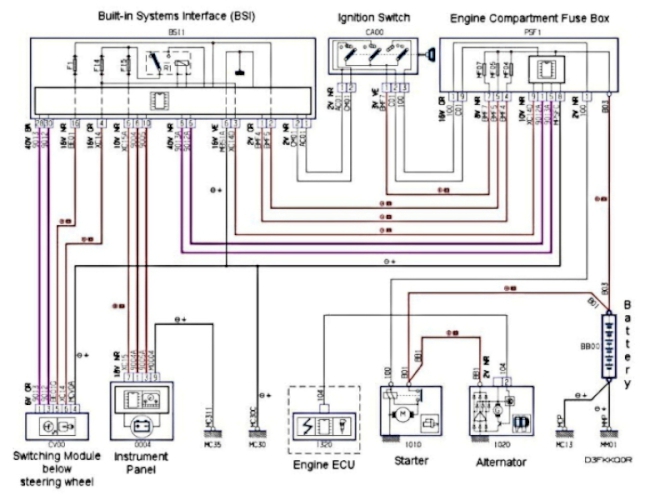Starter Motor
Starter motor failure:
Not definitive, but failure of the starter motor often occurs when hot (it sits just behind the engine so is subject to engine heat). It often continues to work OK when cold which can be confusing when diagnosing.
or it may fail this way:
Car started to make funny noise on passenger side, followed by car engine dying, followed by a flurry of smoke.
If the starter sticks "on", it makes a funny noise because it is forced to turn very fast by the car engine. As it burns out it gives off bluish smoke and smells of burnt plastic.

(Info from Andrew Lamei) Check that this plug/socket in the engine bay fusebox is making good contact first.
The top 2 pins suffer from high current and weaken. It then appears to be a flat battery as battery hasn't charged fully and sometimes sounds as if the starter was faulty, cranking slowly or not even making a clicking sound. Sometimes if you leave it overnight, the following day it might start as if nothing was wrong.
Replacing the starter motor.
This is for a 1.6 petrol, though I believe all models are similarly difficult

First move is to put the car up on ramps as the starter motor comes out from underneath. Bit of a problem if it won't start the engine of course!)
Disconnect the battery after making certain the doors aren't locked! See correct method of disconnecting the battery here

Unfortunately the battery and battery box have to be removed to access the top bolt holding the starter - the job would be relatively easy if it wasn't necessary to remove the battery box!

The starter motor is held in place by three long hex head bolts (two here) - the third bolt is only accessible from the top after removing the battery and battery box.
- plus the two electrical connections have to be disconnected.

To remove the battery box, remove the Air Filter, the Air Silencer and Battery. The ECU will need to be disconnected and put aside.

The battery box is held in place by two bolts and after removal of a great number of wiring support clips, the clipped-in cover at the back and the steering ECU (three more locking plugs) - can be removed by sliding towards the front of the car and lifting it away from the clips.

Looking under a mass of wires, this is the top starter bolt head - remove with 13mm ⅜" socket and extension.
Then from under the car, disconnect the two wiring connections (8mm and 13mm sockets) and the remaining two bolts (13mm socket) using ⅜" sockets and various extensions.
the only way to get the starter motor out is to manoeuvre it to above the main cross-member and jiggle it out to the rear between the cross-member and the car body; it will just go with some patience.

with some difficulty in view of the access, the eyelet was cut off and the wire extended by soldering and with a new Lucar connector.
Reassembly is the reverse of dismantling, as they say!
When all is back together, reconnect the battery - See correct method of reconnecting the battery here - and start the engine. Reset the clock and all should be working normally.

























